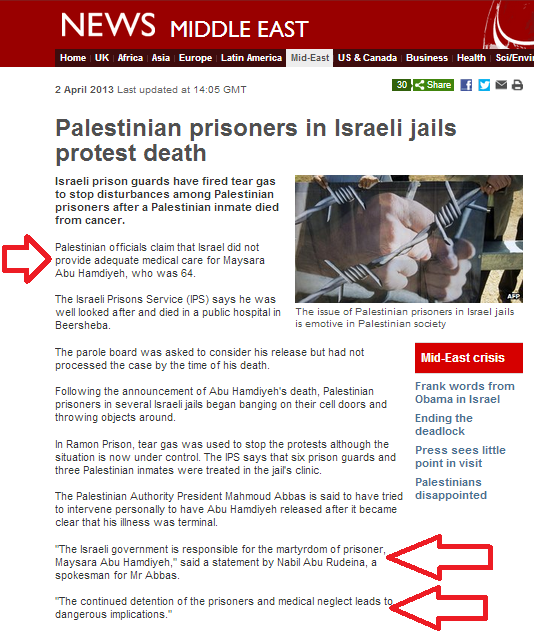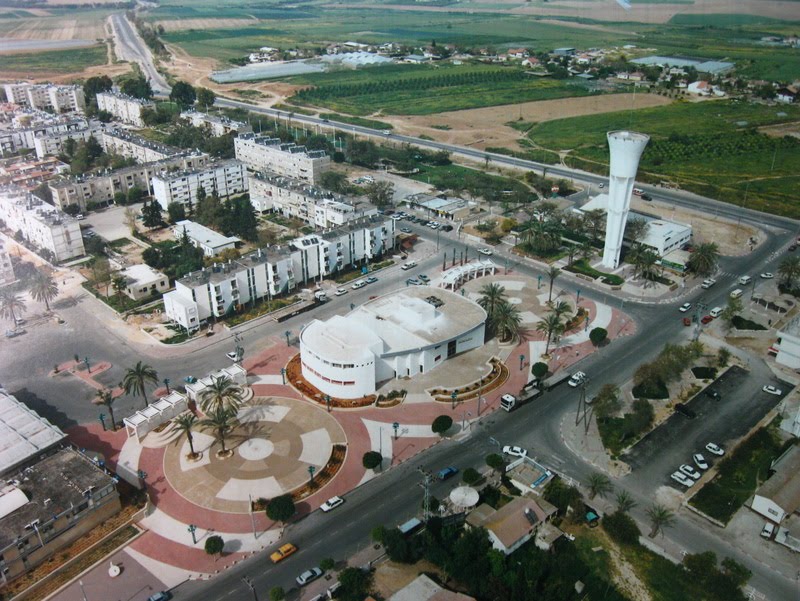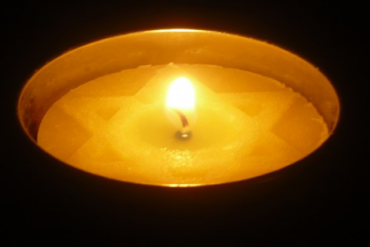As we saw in part one of this post, after over six months and three complaints, the BBC’s Executive Complaints Unit (ECU) finally acknowledged that a claim aired in the BBC Two commissioned programme ‘Alternativity’ in December 2017 was “materially misleading”.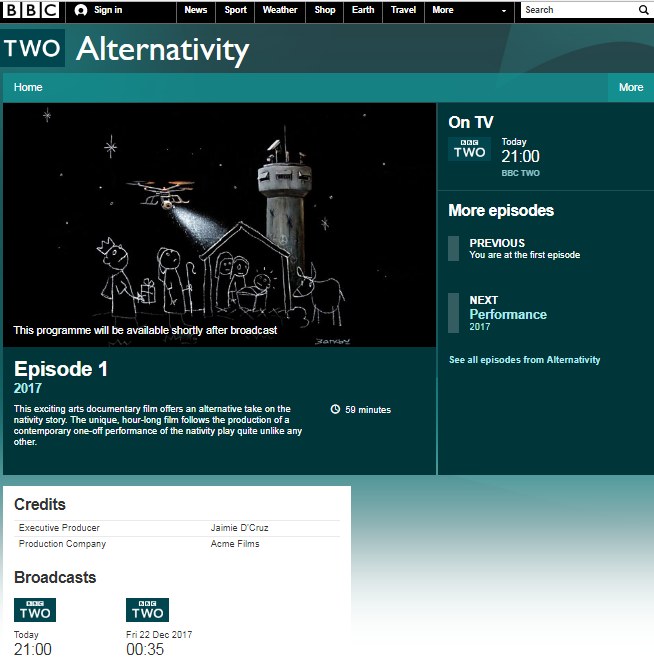
However two additional points made in the same complaint by BBC Watch were rejected by the ECU. As readers may know, the first two stages of the BBC complaints procedure are outsourced to a private company and it is hence interesting to take a look at the responses received on those points.
The second point raised concerned a claim made by Danny Boyle while being filmed in Hebron. As was documented here at the time:
“Standing on Emek Hevron street, Boyle then (22:40) presents pure conjecture as ‘fact’.
Boyle: “And the Star of David on the doorways which is declaring that obviously the…that in these circumstances, declaring that this is…this will become a settlement home…is shockingly reminiscent of something we all…one of the worst horrors of the world. That’s a bit mind-boggling.”
BBC Watch contacted a resident of that area and was informed that the Stars of David painted on those buildings are actually graffiti painted by unknown parties. […]
The doorways mentioned by Boyle are in fact entrances to small Arab market shops that were closed during the second Intifada due to Palestinian violence. Not only are those shops unsuitable for conversion into “a settlement home” – they have never even been considered for that purpose.
As we see, therefore, Danny Boyle – who earlier on in the programme admitted that the nearest he had previously ever been to the region was Majorca – has (presumably with a bit of help from his ‘guides’) let his imagination run wild – and presented his own uninformed assumptions as fact.
Moreover, he appears to be making an oblique reference to Nazi confiscation of Jewish property – an analogy that would be considered antisemitic according to the IHRA working definition adopted by the British government.”
In our initial complaint BBC Watch pointed out that Boyle had presented pure conjecture as fact and that:
“Boyle’s claim that the graffiti ‘declares’ that ‘this will become a settlement home’ is unfounded and inaccurate.”
Although we did not raise the issue of Boyle’s apparent Nazi analogy in that complaint, in the reply received at Stage 1a we were informed by BBC Complaints that what appeared to be the case was in fact so.
“In the course of making the film Danny Boyle spent some time in Hebron (visiting both Hebron 1 and Hebron 2) and saw for himself properties formerly owned by Palestinian residents which were now claimed by Israeli settlers, and he saw that the Star of David was used to mark these properties. His comments in this section of the film are a reflection on what he had seen throughout his visit and on his awareness, as someone who loathes anti-Semitism, of what the Nazis had done to Jewish owned property in Germany in the 1930s.”
In our Stage 1b complaint submitted on January 22nd 2018 we noted that:
“The response provides no proof for the inaccurate claim that the shops on Emek Hevron street “were now claimed by Israeli settlers” – that allegation is simply untrue and unless the BBC can provide factual evidence must be withdrawn. Additionally the response states that Boyle was reflecting on “what the Nazis had done to Jewish owned property in Germany in the 1930s”. The BBC – and Mr Boyle – should be aware that such a Nazi analogy is considered anti-Semitic under the IHRA definition of antisemitism adopted by the UK government.”
The relevant part of the response we received to that complaint was as follows:
“As stated previously, on his trip Danny Boyle saw properties formerly owned by Palestinians that had been claimed by Israeli settlers and marked with the Star of David. It is your contention that the buildings in this specific scene have never even been considered for the purpose of settlement homes. Nonetheless we believe it was appropriate for Danny to comment on a practise that he had seen throughout his visit.”
Needless to say, no details were provided to support the claim that Boyle had seen Star of David graffiti expressing a claim by “Israeli settlers” to “properties formerly owned by Palestinians” in any other location “throughout his visit”.
In our complaint submitted to the ECU on February 28th 2018 we noted that:
“With regard to the second point raised in my complaint, the BBC once again provides no evidence to support the claim that the Star of David graffiti painted by unknown parties on doors on Emek Hevron Street ‘declares’ that ‘this will become a settlement home’. Moreover, it again justifies Boyle’s anti-Semitic Nazi analogy while ignoring the fact that other types of graffiti are in evidence on doorways on the same street.”
We included photographs of that additional graffiti, which includes (see here) Arabic writing and an anarchist symbol.
The reply received from the ECU four months after that Stage 2 complaint was submitted is as follows:
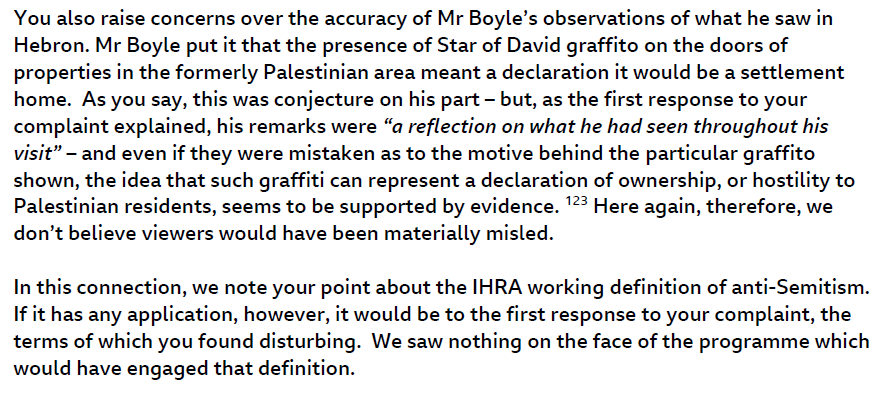
In other words, while admitting that Boyle’s remark was “conjecture” which may have been “mistaken as to the motive behind the particular graffito shown”, the BBC ECU still claims that audiences were not materially misled. The “evidence” cited by the ECU consists of three media reports: one from the Palestinian media outlet ‘Maan News’ dating from 2012, one from the New York Times dated 1997 and one from the Times of Israel dated 2014. While those articles may indeed support the ECU’s claim that graffiti can be a “declaration of…hostility to Palestinian residents”, that was not the claim put forward by Boyle in that part of the programme.
The third point raised in our Stage 1a complaint related to a statement made by the narrator at 33:11: [emphasis added]
Colman: “Most Jewish settlers live in fortified settlements accessible by Israeli-only roads.”
BBC Watch pointed out that the claim is inaccurate and misleading, that even according to B’tselem just four Israeli communities are served by roads upon which vehicles with Palestinian plates cannot travel and that:
“Obviously “most” of the people the BBC chooses to call “Jewish settlers” do not live in those four communities.”
The response received at Stage 1a was as follows:
“Jewish settlements in the West Bank are increasingly connected and served by roads inaccessible to Palestinians without Israeli citizenship and Israeli license plates. This is a result of the ongoing Israeli policy of expanding the settlements and their infrastructure.”
When we challenged that response – obviously irrelevant to the point made in the original complaint – at Stage 1b, this was the reply received:
“It is not disputed that the majority of West Bank settlers live in settlements. It is also the case that these settlements are accessible by the network of roads which place restrictions on Palestinians without Israeli citizenship and Israeli license plates.”
In our Stage 2 complaint to the ECU we pointed out that:
“With regard to the third point made in my complaint, the claim that “Most Jewish settlers live in fortified settlements accessible by Israeli-only roads” is simply untrue and the BBC’s claim that “these settlements are accessible by the network of roads which place restrictions on Palestinians without Israeli citizenship and Israeli license plates” is only applicable to the entrance roads to a small number of communities – totaling at most less than 60 kms.”
Four months later the ECU replied with no small amount of ‘whataboutery‘, quoting a report from the politicised UN agency UNOCHA.
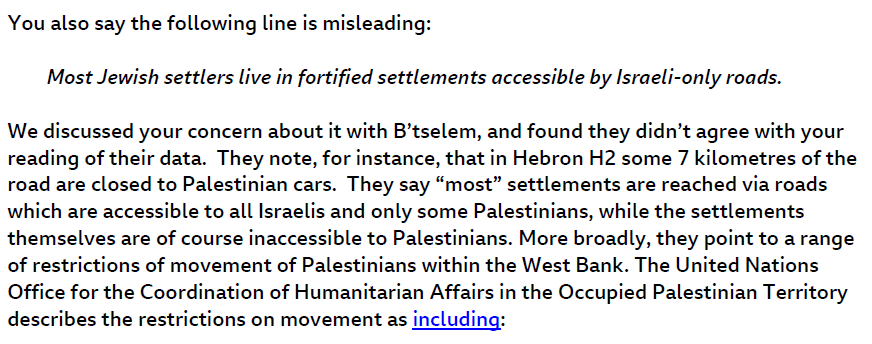

Readers can judge for themselves whether six months is an acceptable time-frame for the resolution of a complaint to the BBC and whether or not the practices of outsourcing complaints to a private company and basing responses to complaints on information supplied by political NGOs serves the interests of the public that funds the corporation.
Related Articles:
BBC’s ECU upholds part of BBC Watch ‘Alternativity’ complaint – part one
How the BBC outsources its complaints system
Political narrative and inaccuracy in BBC Two’s ‘Alternativity’ – part one
Political narrative and inaccuracy in BBC Two’s ‘Alternativity’ – part two

